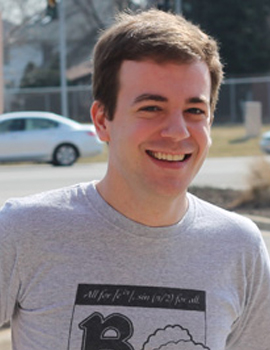
Anthony DeLegge, PhD
Department Chair, Mathematical and Computational Sciences
Professor
Chair, Heath Professions Recommendations Committee
Faculty Email: adelegge@ben.edu
Phone: 630-829-6556
Office Location: Birck 125
BenU faculty since 2010
Ph.D., University of Nebraska-Lincoln (2010)
M.S., University of Nebraska-Lincoln (2008)
B.S., Benedictine University (2005)
Courses Taught
College Algebra, Calculus, Differential Equations, Discrete Mathematics, Theory of Interest, Special Topics – Graph Theory, Writing Colloquium, Gambling in the U.S.
Research Area
Epidemiological models (using systems of differential equations), Games and probability
Current Research Projects
- “The Effects of Vaccine Misinformation on Disease SpreadIn the spring of 2021, vaccines from Pfizer, Moderna, and Johnson and Johnson became available to the general public to help protect against COVID-19. Since then, a total of 70% of the eligible population in the U.S. has been fully vaccinated against the disease, but this still leaves over 60,000,000 completely unvaccinated. One reason for this has been the spread of misinformation regarding the vaccines, ranging from the seemingly plausible (vaccine affects fertility, COVID isn’t that bad of a disease) to the absurd (vaccine will implant 5G microchip). Although all of this misinformation has been debunked in some form or another, it persists and can form the basis for people refusing to take the vaccine.The aim of this project is to build a mathematical model for the spread of a disease through a population where a vaccine is available. We will then introduce an active misinformation spread to try and answer the question: What are the short-term and long-term effects of vaccine misinformation on the spread of a disease where a vaccine is available? Is it simply a nuisance, or does it have a profound effect on the disease spread?
- “Will Facebook Be #1 Forever? A Competition Analysis”In the early 2000s, online social networking was dominated by two sites: Facebook and MySpace. In 2005, MySpace was the #1 social network in terms of site visits and users, and Facebook was an up-and-comer. However, by 2007, their roles reversed, and Facebook not only took the #1 spot, which it has not relinquished since, but MySpace began a rapid decline in usage, eventually becoming obsolete in 2012. But, with so many social media sites now such as X, Instagram, Snapchat, TikTok, and LinkedIn, all in competition with Facebook for users, is it possible for another network to do to Facebook what Facebook did to MySpace? Or, has Facebook built such a strong user base that it will remain the #1 social media site “forever”?The aim of this project is to build a mathematical model for competition, but allowing for users to potentially be on multiple networks at the same time. This model will hopefully address whether it is possible for another social media site to take over Facebook’s top spot or not.
- “Come On Down! The Math Behind TV Game Shows”Since the dawn of television in the 1940s, game shows have consistently been among the most popular programs on television. Viewers at home cheer for contestants as they win a new car on The Price is Right, shout out answers (sorry, questions!) while watching Jeopardy!, and dream of meeting Vanna White and spinning the Wheel of Fortune. But, what is the secret to winning on these game shows? For some shows, it turns out a little mathematical knowledge can go a long way to seeing whether it’s worth it to spin again for more money, or even the optimal strategy to picking prices for cars.This project consists of studying various TV game shows where knowledge of math and probability can help influence a contestant’s chances of winning, such as The Price is Right, Press Your Luck, Let’s Make a Deal, and Monopoly Millionaires Club and trying to see if that knowledge can be used by a savvy contestant to increase their chances of winning big.
